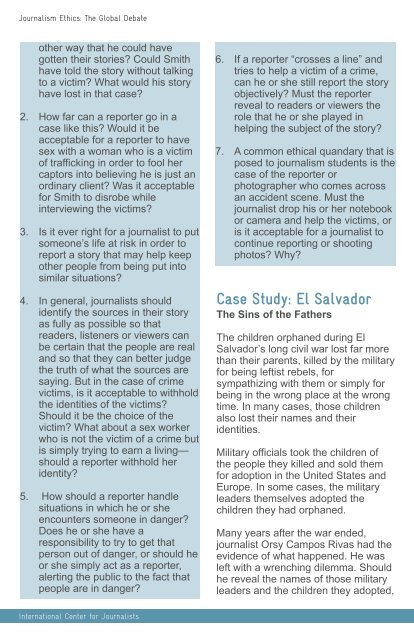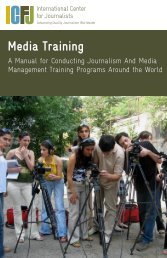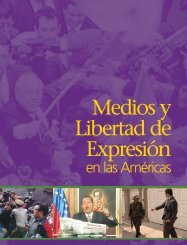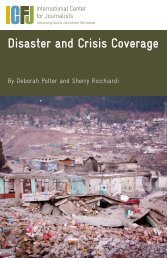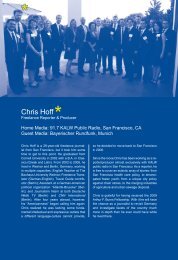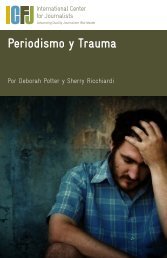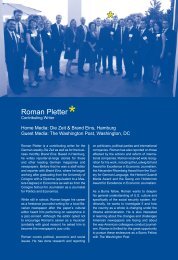Download PDF - International Center for Journalists
Download PDF - International Center for Journalists
Download PDF - International Center for Journalists
You also want an ePaper? Increase the reach of your titles
YUMPU automatically turns print PDFs into web optimized ePapers that Google loves.
Journalism Ethics: The Global Debate<br />
other way that he could have<br />
gotten their stories? Could Smith<br />
have told the story without talking<br />
to a victim? What would his story<br />
have lost in that case?<br />
2. How far can a reporter go in a<br />
case like this? Would it be<br />
acceptable <strong>for</strong> a reporter to have<br />
sex with a woman who is a victim<br />
of trafficking in order to fool her<br />
captors into believing he is just an<br />
ordinary client? Was it acceptable<br />
<strong>for</strong> Smith to disrobe while<br />
interviewing the victims?<br />
3. Is it ever right <strong>for</strong> a journalist to put<br />
someone’s life at risk in order to<br />
report a story that may help keep<br />
other people from being put into<br />
similar situations?<br />
4. In general, journalists should<br />
identify the sources in their story<br />
as fully as possible so that<br />
readers, listeners or viewers can<br />
be certain that the people are real<br />
and so that they can better judge<br />
the truth of what the sources are<br />
saying. But in the case of crime<br />
victims, is it acceptable to withhold<br />
the identities of the victims?<br />
Should it be the choice of the<br />
victim? What about a sex worker<br />
who is not the victim of a crime but<br />
is simply trying to earn a living—<br />
should a reporter withhold her<br />
identity?<br />
5. How should a reporter handle<br />
situations in which he or she<br />
encounters someone in danger?<br />
Does he or she have a<br />
responsibility to try to get that<br />
person out of danger, or should he<br />
or she simply act as a reporter,<br />
alerting the public to the fact that<br />
people are in danger?<br />
6. If a reporter “crosses a line” and<br />
tries to help a victim of a crime,<br />
can he or she still report the story<br />
objectively? Must the reporter<br />
reveal to readers or viewers the<br />
role that he or she played in<br />
helping the subject of the story?<br />
7. A common ethical quandary that is<br />
posed to journalism students is the<br />
case of the reporter or<br />
photographer who comes across<br />
an accident scene. Must the<br />
journalist drop his or her notebook<br />
or camera and help the victims, or<br />
is it acceptable <strong>for</strong> a journalist to<br />
continue reporting or shooting<br />
photos? Why?<br />
Case Study: El Salvador<br />
The Sins of the Fathers<br />
The children orphaned during El<br />
Salvador’s long civil war lost far more<br />
than their parents, killed by the military<br />
<strong>for</strong> being leftist rebels, <strong>for</strong><br />
sympathizing with them or simply <strong>for</strong><br />
being in the wrong place at the wrong<br />
time. In many cases, those children<br />
also lost their names and their<br />
identities.<br />
Military officials took the children of<br />
the people they killed and sold them<br />
<strong>for</strong> adoption in the United States and<br />
Europe. In some cases, the military<br />
leaders themselves adopted the<br />
children they had orphaned.<br />
Many years after the war ended,<br />
journalist Orsy Campos Rivas had the<br />
evidence of what happened. He was<br />
left with a wrenching dilemma. Should<br />
he reveal the names of those military<br />
leaders and the children they adopted,<br />
<strong>International</strong> <strong>Center</strong> <strong>for</strong> <strong>Journalists</strong>


